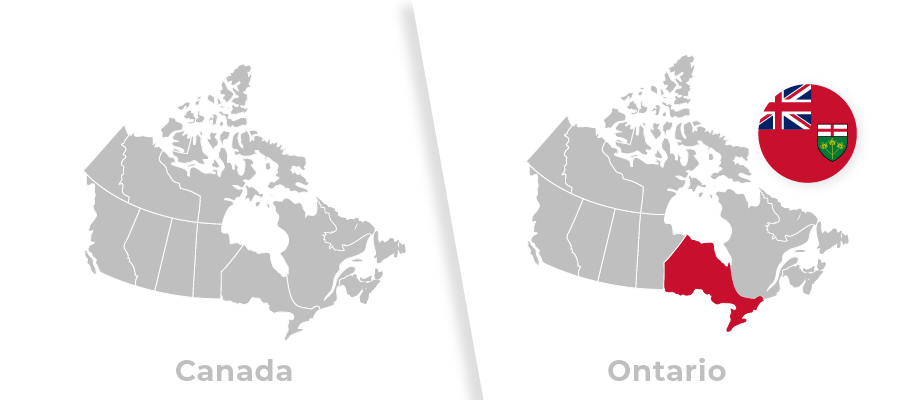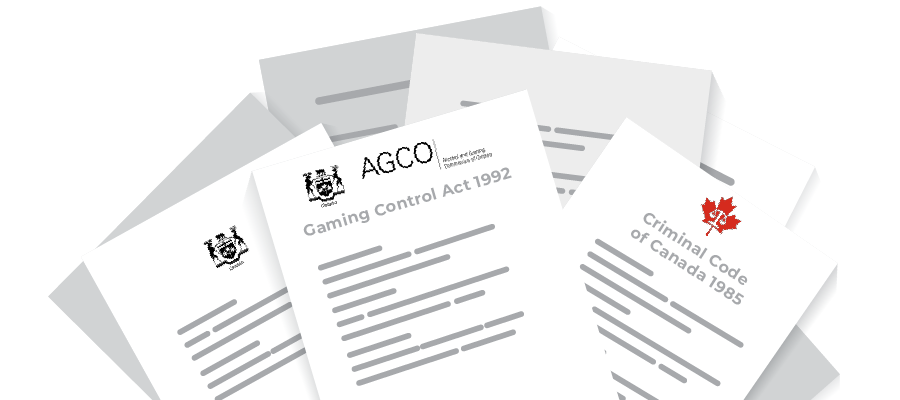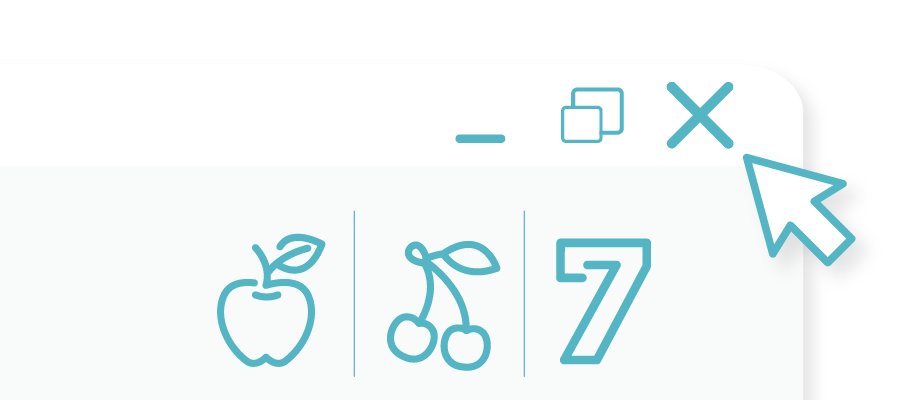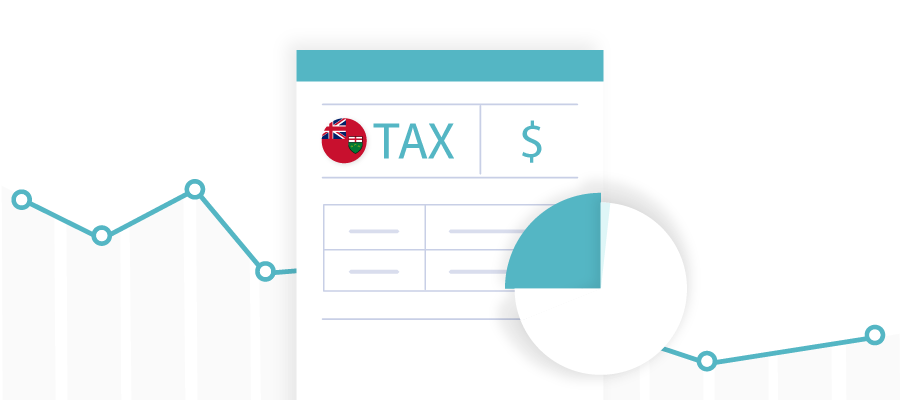Is it legal and safe to gamble in Ontario? Well, yes, it sure is, but with all licensed jurisdictions, there are things you need to know to ensure you keep safe and have fun.
As a country, Canada has both national and regional laws and regulations when it comes to gambling, and for this guide, we are focusing on Ontario only.
Ontario opened its region to gambling in early 2022 when it passed updated Ontario gambling laws to allow private organisations to apply for and run online gambling companies for players based in Ontario.
In this guide, lawyer Kirsty Caldwell will teach you:
Let's get started!

Canada has both national and regional laws and regulations, and Canada’s national laws allow gambling in some situations.
However, various Canadian regions overrule that and prohibit gambling, while some even enhance the laws further on the types of gambling permitted.
Luckily for Ontario, it is legal to gamble for local players as long as you play with a licensed operator. This article will focus on online or “remote” gambling in Ontario.
Yes, providing it is with licensed operators, and there are some things that you need to know to make sure you are spending your money with reputable gambling operators and benefit from the protections that this offers.
Operator licenses are issued by iGaming Ontario (iGO), a subsidiary of the Alcohol and Gaming Commission of Ontario (AGCO).
iGO publishes a list of licensed and authorized gambling operators on their site, so please check to see if the company you want to register with is on the list.
There is also a provincial gambling operator, OLG, which presents gambling products provided by the Ontario authorities, including lottery products.
The Ontario legal gambling age for most types of gambling is 19 (18 for lotteries), and you will need to register an account with the gambling website, you must be in Ontario.
Please note
If you gamble with an unlicensed operator, you are personally breaking the law and are liable to imprisonment for up to 2 years.

- Betting. Betting on single events is legal. The most common type of betting is fixed odds where a gambling company sets the odds of a result happening and you place your bet. Pool (pari-mutuel) betting is also licensed.
- Bingo. Bingo can be run for charitable purposes by registered charities.
- Casinos. Online casinos provide all the usual casino games via their websites, including slots, blackjack, roulette, etc.
- Lottery. The provincial OLG provides the OLG.ca website where the state lottery products can be played.
- Live dealer games. These are the usual casino table games (blackjack, roulette, etc.) but with a live host that deals the cards, spins the wheel, etc., and you see the game action live on your screen.
- In-Play betting. This is where you can place bets on a sporting event while it is happening. The gambling company will change the odds as the event goes on, and you can choose to place a bet on what may happen in the event.
You will find many licensed gambling websites in Ontario, but you should check that they hold a valid iGO license.
You will need to register an account by providing your personal information, including ID information which will be reviewed.
All websites will allow you to use debit cards, and some will allow credit cards.
However, some credit card issuing companies may ban gambling transactions while others may treat gambling deposits as cash advances and therefore charge you a transaction fee.
Most will have additional payment mechanisms such as PaySafe Card, ApplePay etc.
Be aware
Some payment methods will allow you to deposit but not withdraw using their products, so please check with the gambling operator or the payment solution so you know how you can withdraw your money if you win!

The main laws for gambling in Ontario are the Gaming Control Act 1992 and the Criminal Code of Canada 1985.
The Ontario Gaming Control Act 1992
This act provides the rules covering gambling in Ontario, including the need to be licensed, the types of gambling permitted, and the frameworks for licensing and regulation.
The Act is updated often to meet the demands of advancements in society and technology, but more recent technological advances are not explicitly covered.
In 2022 Ontario further enhanced the laws permitting private operators to apply for licenses for gambling operations which is why there has been a significant increase in interest within Ontario.
The Criminal Code of Canada 1985
This is the federal law of Canada and includes definitions of most of the criminal offenses that are covered by the legal process. Although the title includes “1985,” this is the original year of enactment, and amendments are added frequently and adopted into the original law.
The constitution of Canada gives the federal government the power to make criminal laws, and as a result, criminal law applies across the country.
Provinces and territories are responsible for enforcing the criminal law, which is why both national and regional gambling laws exist.
Let’s explore some of the key details you need to keep in mind about the Ontario gambling regulations:
The Alcohol and Gaming Commission of Ontario (AGCO)
AGCO has the power to regulate gambling in Ontario, including online gambling. It is a relatively new regulator that carries out investigations, publishes rulings, and provides detailed guidance and notices related to gambling licensing.
iGaming Ontario (iGO)
The iGO was established in 2021 as a subsidiary of AGCO to manage the licensing of private companies providing gambling products and services. It manages the licensing of gambling operators and service providers to the industry, such as companies making online games.
The regulations, guidance documents etc.

Ontario has developed regulations and guidance very quickly, and these all come together to create the regulatory environment that gambling companies must work within.
AGCO publishes the Registrar’s Standards for Internet Gaming, which are the standard requirements for operators to meet, the Internet Gaming Operator Application Guide, which is the guidance for operators on what they must do to apply for a license and the Internet Gaming Go-Live Compliance Guide which informs the operator of what they must do to start presenting gambling opportunities to players.
What about safer gambling?

The regulations place great importance on Safer Gambling, meaning that licensed operators may ask you questions about your gambling activity.
All gambling companies must operate their own self-exclusion schemes, which means a player can register and then will not be allowed to gamble with that company until the self-exclusion period has expired.
Players must also be provided with tools that help them control their gambling. These can be based on time spent gambling, the amount of money deposited or lost, or the ability to block a certain type of gambling (such as Casino games).
Providing help and support for gambling problems

Gambling companies must proactively review their players' gambling activity and identify where gambling harm may occur. This is to protect players from the negative impacts of gambling more than is safe or affordable.
In addition, gambling companies must provide contact details of gambling harm support organisations (such as Connex Ontario and Responsible Gambling Council) which give telephone help, group therapy, and other support practices for players that are having problems managing their amount of gambling activity.
Strictly speaking, as a gambler, you are not protected directly by the regulators. AGCO & iGO license and regulate the gambling industry and make sure the industry operates within the rules.
However, they do not usually get involved with individual customer cases or compensate any player who has suffered a loss, even if a subsequent investigation finds that the gambling company has acted unlawfully.
The regulations require that every gambling company has a customer complaints procedure that must be followed and made available to the public. The complaints policies and procedures must be lawful both under Canada's national laws and Ontario's regional laws.
So, by making sure the gambling companies operate correctly, the regulators ensure that you are fully aware of what systems are in place to protect you.
Keep in mind
As with all things, please read the terms and conditions and policies of any gambling company you engage with to make sure you are happy with any benefits and restrictions provided.
Know Yor Customer (KYC) Procedures

When you register with a licensed gambling website, you must enter your details and provide identity information.
The gambling company will use their systems to complete checks, including ID verification and some background “Know Your Customer” verification, which they must do under regulations.
You can then deposit funds via a recognized payment service, and transactions are verified with the provider every time.
Multi-Factor Authentication

Some gambling companies offer their players the chance to use Multi-Factor Authentication, which allows them to confirm that it is them logging in to their account.
For withdrawals some payment solutions do not allow withdrawals to be made using their products. Also, be aware that other non-gambling regulations may require additional checks and verification processes, and therefore the gambling company may ask you for more information to satisfy those requirements.
Responsible Gambling Tools

All gambling websites must provide responsible gambling tools to help you manage your gambling activity, ranging from:
- total blocks;
- short-term “take a break” sessions;
- financial controls;
- product blocking.
If you want to stop gambling entirely with a particular website, you can use its self-exclusion procedure to register your details, and as soon as you do that, you will no longer be able to use that website.
This is intended to be a medium to long-term block, and after the period you specify has passed, the block will remain in place until you have told the company that you want to start gambling again.
All licensed gambling companies have a duty of care towards you, meaning they must monitor how you play and assess whether you might be at risk of being harmed through gambling.
You should expect regular checks on your gambling activity and questions about whether you are comfortable with how much money and time you spend gambling.
Licensed operators must create a risk profile for players with a high risk of gambling harm. Many companies use questionnaires that are then scored for any potential risk of harm.
Remember
While some players see these checks as intrusive and overly personal, they are necessary to ensure they are provided with help and support when needed.Many support groups and organizations provide everything from telephone support to group sessions and education.
Taxes on Gambling in Ontario

Playing on an Ontario-licensed gambling website, you do not pay tax on any winnings unless it is your primary source of income. That is, if you are a professional gambler, then you must pay taxes. Otherwise, 100% of any money you win, you keep.
However, if you are registered to pay tax in another country, local laws may require you to declare your winnings, so you should check with the local authorities.
Canadian and Ontario laws make all unlicensed gambling illegal for the operator and the player. Therefore, check that the operator you are registered with does have an Ontario license.
Licensed companies are subject to frequent audits, and the law and regulations are frequently updated to ensure that modern developments are considered and subject to guidance and requirements from the regulator.
Through regulation, licensed companies must also have strong customer complaints procedures and therefore have some support if a licensed company does something you disagree with.
All the above means that you are protected and at far lower risk of having problems. When problems happen, you have support to rectify the situation efficiently.

The application process in Canada is more involved than in some other countries, as it is a staged application process.
A company applying for a license must be approved at each stage before moving on to the next.
A prospective operator applies first to AGCO for an operating license and, once approved, can agree with iGO to provide gambling products to players.
Both companies intending to provide gambling opportunities to players and suppliers who offer gambling products must be licensed. The latter are known as “Gaming Related Suppliers.”
Licensed operators must pay $100,000 (CAD) per website as an application fee and then annually afterward. This should mean that only serious companies believe it is worth operating in Ontario and should increase the industry's quality. Other fees exist, and the full range can be found in the registration fee section. Applications are made via an online portal, iAGCO.
Applications must be supported by detailed information, and the regulator is willing to help applicants during the process and will advise on what information is needed. The list of possible information is as follows:
- Application pack
- Registrar’s Standards Gap Analysis
- Personal Disclosure for key individuals
- Regulatory fee
- Any requested investigation fee
Further supporting documents may include:-
- Business Name Registration
- Constituting Document(s)
- Articles of Incorporation
- Charter/By-Laws
- Partnership Agreement & member details
- Shareholder’s Agreement details
- Trust Agreement
- Financial Statements
- Government-Issued Identification
- Personal History – Gaming
- System schematic (IT systems and website)
- Tax Returns and Assessments
- Criminal Background Check (if not Canada resident)
- List of Suppliers
The Ontario authorities are very approachable, but as with all such licensing processes, companies will find it beneficial to have local legal representation and other advisors to guide them through the process.
There will be an interview with the regulators to review both the application information and the professional background of the organization’s key staff.
AGCO publishes various documents to help companies work through the application process as follows:-
How do companies keep the license?
The regulators issue lots of guidance to help companies maintain their licenses and to ensure that they run their organizations safely and legally. As with all such operations, there are also other legal requirements that any company, whether a gambling one or not, must adhere to.
One of the main focuses of any gambling-related organization is managing the threat of money laundering and terrorist financing.
Operators are duty-bound to attempt to identify suspicious behavior and report it where they believe it is happening. They must ensure that they know sufficient information about their players and where the money they gamble with originated.
You may be asked for identity information (driver’s license, passport, etc.) and the origin of the funds you deposit into a gambling account. Companies must keep the information up to date, so you may be asked to renew previously provided information or provide new documents as time passes.
Another primary concern for operators is safer gambling. They are required to actively monitor the playing patterns of registered players to ensure that they are not experiencing harm from gambling. You may be asked questions about your gambling activity so they can determine if they need to provide support or take any actions to minimize the risk of harm.
If a player is identified as being at high risk of harm, then the operator must create a risk profile and use this to help him with any risk-related issue. Usually, an operator would discuss any concerns with the player and agree on using safer gambling tools such as deposit or loss limits, time outs, etc.
Remember
All of this work is done to protect both you as a player and the industry from both harmful and illegal behavior and works to make the environment safer to use.
Closing thoughts
Choosing to gamble with an Ontario licensed operator is selecting a highly regulated, legal, and well-managed environment that can be entertaining. As the application and license granting process is so involved and organized, any properly licensed operator has already shown they can meet high standards.
There are many different companies to choose from, offering a wide variety of gambling products. Licensed gambling companies operate fairly and support their players well with friendly customer services teams and easy-to-use websites. Therefore, it is an excellent way to go if you like the thrill and excitement of online gambling.
Just remember to check that the gambling company is licensed and to gamble only the amount you can afford to lose. And, if you want to learn more about gambling legislation worldwide, check out the Laws and Regulations Academy.
Above all else, have fun and good luck!

Bonuses
Casinos
Games
Academy
News
Shop
NEW Q&A
Sweepstakes
















